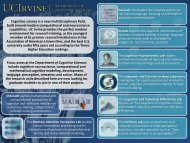Conscious Realism and the Mind-Body Problem - UCI Cognitive ...
Conscious Realism and the Mind-Body Problem - UCI Cognitive ...
Conscious Realism and the Mind-Body Problem - UCI Cognitive ...
You also want an ePaper? Increase the reach of your titles
YUMPU automatically turns print PDFs into web optimized ePapers that Google loves.
<strong>Conscious</strong> <strong>Realism</strong> <strong>and</strong> <strong>the</strong> <strong>Mind</strong>-<strong>Body</strong> <strong>Problem</strong> 105This comment is correct, pace Kant. Space, time, particles, <strong>and</strong> <strong>the</strong>reforenatural selection are all within <strong>the</strong> user interface. But this claimcomports well with recent attempts in physics to construct a <strong>the</strong>ory ofeverything – including space, time <strong>and</strong> particles – from more fundamentalconstituents, such as quantum information <strong>and</strong> quantum computing (e.g.,Lloyd 2006), loop quantum gravity (Smolin 2006), <strong>and</strong> o<strong>the</strong>rs (e.g., Callender<strong>and</strong> Huggett 2001). Space-time, classically conceived as a smoothmanifold, appears untenable at <strong>the</strong> Planck scale. Instead <strong>the</strong>re appear tobe “pixels” of space <strong>and</strong> time. The intuition that space-time is a fundamentalconstituent of an observer-independent reality seems destined tobe overturned by <strong>the</strong>ories of quantum gravity.The ontology of conscious realism proposed here rests crucially on<strong>the</strong> notion of conscious agents. This notion can be made ma<strong>the</strong>maticallyprecise <strong>and</strong> yields experimental predictions (Bennett et al. 1989, 1991;Bennett et al. 1993a,b; Bennett et al. 1996). Space precludes presenting<strong>the</strong> ma<strong>the</strong>matics here, but a few implications of <strong>the</strong> definition of consciousagent should be made explicit. First, a conscious agent is not necessarilya person. All persons are conscious agents, or heterarchies of consciousagents, but not all conscious agents are persons. Second, <strong>the</strong> experiencesof a given conscious agent might be utterly alien to us; <strong>the</strong>y may constitutea modality of experience no human has imagined, much less experienced.Third, <strong>the</strong> dynamics of conscious agents does not, in general, take placein ordinary four-dimensional space-time. It takes place in state spaces ofconscious observers, <strong>and</strong> for <strong>the</strong>se state spaces <strong>the</strong> notion of dimensionmight not even be well-defined. Certain conscious agents might employ afour-dimensional space-time as part of <strong>the</strong>ir MUI. But again, this is notnecessary.From <strong>the</strong>se comments it should be clear that <strong>the</strong> definition of a consciousagent is quite broad in scope. Indeed, it plays <strong>the</strong> same role for <strong>the</strong>field of consciousness that <strong>the</strong> notion of a Turing machine plays for <strong>the</strong>field of computation (Bennett et al. 1989).7. The <strong>Mind</strong>-<strong>Body</strong> <strong>Problem</strong>We now use MUI <strong>the</strong>ory <strong>and</strong> conscious realism to sketch a solutionto <strong>the</strong> mind-body problem. Exactly what that problem is depends, ofcourse, on one’s assumptions. If one adopts physicalism, <strong>the</strong>n <strong>the</strong> centralscientific problem is to describe precisely how conscious experience arisesfrom, or is identical to, certain types of physical systems.As we discussed before, <strong>the</strong>re are no scientific <strong>the</strong>ories of <strong>the</strong> physicalistmind-body problem. If one adopts conscious realism, <strong>the</strong>n <strong>the</strong> centralmind-body problem is to describe precisely how conscious agents constructphysical objects <strong>and</strong> <strong>the</strong>ir properties.







